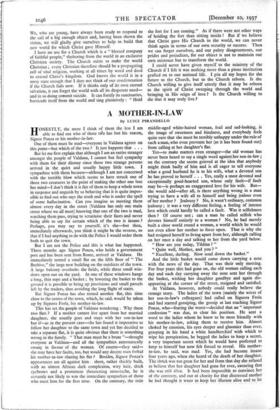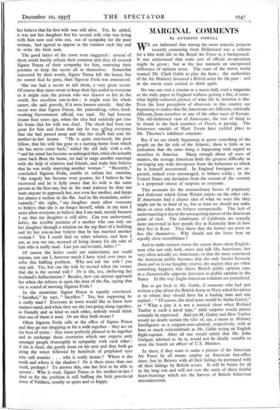A MOTHER-IN-LAW
By LUIGI PIRANDELLO
HONESTLY, the more I think of them the less I am able to find out who of those to has lost his reason, Signor Ponza or his mother-in-law.
One of them must be mad—everyone in Valdana agrees on this point—but which of the two ? It just happens that . . .
But let me first explain that although I am an entire stranger amongst the people of Valdana, I cannot but feel sympathy with them for their dismay since those two strange persons arrived in the quiet and usually happy little town. I sympathise with them because—although I am not concerned with the terrible blow which seems to have struck one of those two creatures to the point of making the other one lose her mind—I don't think it is fair of them to keep a whole town in suspense and anguish by so behaving that it is quite impos- sible to find out who says the truth and who is under the spell of some hallucination. Can you imagine us meeting them almost every day in the street (Valdana has only one main street where we all meet) knowing that one of the two is mad, watching them pass, trying to scrutinise their faces and never being able to say for certain which of the two is insane ? Perhaps, you may say to yourself, it's she—but then, immediately afterwards, you think it might be the reverse, so that if I had anything to do with the Police I would order them both to quit the town.
But I am not the Police and this is what has happened. Three months ago Signor Ponza, who holds a government. post and has been sent from Rome, arrived at Valdana. He immediately rented a small flat on the fifth floor of " The Beehive," the large new building on the outskirts of the town. A large balcony overlooks the fields, while three small win- dows open out on the yard. At one of these windows hangs a long, thin rope and a basket ; by lowering the basket to the ground it is possible to bring up provisions and small parcels left by the traders, thus avoiding the long flight of stairs.
But Signor Ponza has also rented another flat, this time close to the centre of the town, which, he said, would be taken up by Signora Frola, his mother-in-law.
This has set the people of Valdana wondering : Why these two flats ? If a mother cannot live apart from her married daughter, she usually goes and stays with her son-in-law but if—as in the present case—she has found it imperative to follow her daughter to the same town and yet has decided to take a separate flat, it is quite obvious that there is something wrong in the family. "That man must be a brute "—thought everyone at Valdana—and all the iympathies. automatically swung in favour of the woman. Of course—they said— she may have her faults, too, but would any decent man forbid his mother-in-law sharing his flat ? Besides, Signor Ponza's appearances are all against him : short, rather thickly built, uith an almost African dark complexion, wiry hair, thick eyebrows and a prominent threatening moustache, he is certainly not likely to win the immediate sympathies of those who meet him for the first time. On the contrary, the little middle-aged white-haired woman, frail and sad-looking, is the image of sweetness and kindness, and everybody feels quite sure that she must be terribly unhappy under the rule of such a man, who even prevents her (as it has been found out) from calling at her daughter's flat.
Yet—to make matters even stranger—the old woman has never been heard to say a single word against her son-in-law ; on the contrary she seems grieved at the idea that anybody might think badly of him and is all eager to tell everyone what a good husband he is to his wife, what a devoted son he has proved to herself . . . Yes, really a most devoted and exceptionally good-hearted son, whose only fault—if fault may be—is perhaps an exaggerated love for his wife. But— she would add—after all, is there anything wrong in a man trying to have a wife all to himself and being jealous even of her mother ? Jealousy ? No, it wasn't ordinary, common jealousy ; it was a very different feeling, a feeling of intense love which could hardly be called a fault. Was it selfishness then ? Of course not ; can a man be called selfish who devotes himself entirely to a woman ? No, he had merely built a close world round a woman, a world which he would not even allow her mother to force open. That is why she had resigned herself to living apart from her, although calling on her once a day and talking to her from the yard below. "How are you today, Tildina ? "
"Quite well, Mother, and you ? "
"Excellent, darling. Now send down the basket."
And the little basket would come down carrying a note with the news of the day. That was their only meeting.
For four years this had gone on, the old woman calling each day and each day carrying away the note sent her through the basket, wishing her daughter goodbye and again dis- appearing at the corner of the street, resigned and satisfied.
At Valdana, however, nobody could really believe the strange story. The ladies of the town (mainly the wives of her son-in-law's colleagues) had called on Signora Frola and had started gossiping, the gossip at last reaching Signor Ponza, who—fearing the worst—decided that an "important confession" was due, to clear his position. He sent a word to the ladies whom he knew to be most friendly with his mother-in-law, asking them to receive him. Almost choked by emotion, his eyes deeper and gloomier than ever, grasping in his hand a white handkerchief with which to wipe his perspiration, he begged the ladies to keep a secret, a very important secret which he would have preferred to keep to himself but now felt forced to reveal. His mother- in-law, he said, was mad. Yes, she had become insane four years ago, when she heard of the death of her daughter.
The shock was too great for her and from that day she refused to believe that her daughter had gone for ever, swearing that she was still alive. It had been impossible to convince her of the contrary, and out of charity for that distressed mother he had thought it wiser to keep her illusion alive and to let her believe that his first wife was still alive. Yet, he added, it was not her daughter but his second wife who was living with him now and who too, out of sympathy for the poor woman, had agreed .to appear at the window each day and to write the little note.
The good ladies of the town were staggered : several of them could hardly refrain their emotion and they all assured Signor Ponza of their sympathy for him, renewing their promise to keep the secret all to themselves. Somewhat reassured by their words, Signor Ponza left the house, but no sooner had he gone, than Signora Frola was announced.
-She too had a secret to tell them, a very great secret. Of course they must swear to keep their lips sealed to everyone or it might ruin the person who was dearest to her in the world, her excellent son-in-law ; it might ruin his whole career, she said gravely, if it were known outside. And the secret was that Signor Ponza, the painstaking, sober, hard- working Government official, was mad. He had become insane four years ago, when the idea had suddenly got into his brain that his wife was dead. The shock had been too great for him and from that day he was telling everyone that she had passed away and that her deal had sent his mother-in-law insane. "He is quite convinced, the poor fellow, that his wife has gone to a nursing home from which she has never come back," added the old lady with a sob, "and his mind has become so unhinged that, when she actually came back fkm the home, we had to stage another marriage with the help of relatives and friends, and make him believe that he was really marrying another woman." "Recently," concluded Signora Frola, unable to refrain her emotion, "the tragedy has become even greater, for I believe he has recovered and he is fully aware that his wife is the same person as the first one, but in his mad jealousy he does not want anyone to approach her, not even her mother, and keeps her almost a recluse in the flat. And in the meantime, unfor- tunately," she sighs, "my daughter must allow everyone to believe that she is no longer herself, while in my turn I must allow everyone to believe that I am mad, merely because I say that my daughter is still alive. Can you understand, ladies, the terrible position of a mother who can only see her daughter through a window on the top floor of a building and let her -son-in-law believe that he has married another wornin ? Yet I could find no other solution, and here I am, as you see me, accused of being insane for the sake of him who is really mad. Can you understand, ladies ? "
Of course the ladies could not understand, nor could anyone, nor can I, however much I have tried ever since to solve this baffling problem. Why not 'ask the wife ? you may ask. Yes, but can the wife be trusted when she swears that she is the second wife ? Or is she, too, sheltering her husband's hallucination ? Besides, how can anyone approach her when she refuses to open the door of the flat, saying that she is scared of meeting Signora Frola ?
In the meantime Signor Ponza is equally convinced. "Sacrifice," he says, "Sacrifice." Yes, but supposing he is really mad ? Everyone in town would like to know how matters stand, and when they see the two going along together, so friendly and so kind to each other, nobody would think that one of them is mad. Or are they both insane ?
Often Signora Frola calls at the office of Signor .Ponza and they go out shopping or for a walk together : they are on the best of terms : they seem perfectly pleased to be together and to exchange those courtesies which one expects only amongst people thoroughly in sympathy with each other : if she is tired, she gently leans on his arm and they both go along the street followed by hundreds of perplexed eyes who still wonder . . . who is really insane ? Where is the truth and where is the shadow ? Or is there more than one truth, perhaps ? To answer this, one has first to be able to answer : Who is mad, Signor Ponza or his mother-in-law ? And so far the problem is still baffling the little provincial town of Valdana, usually so quiet and so happy.























































 Previous page
Previous page